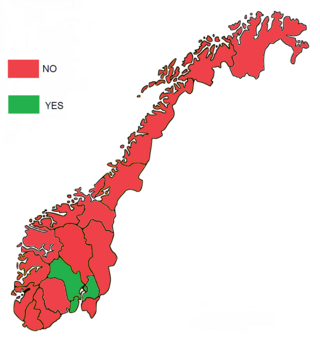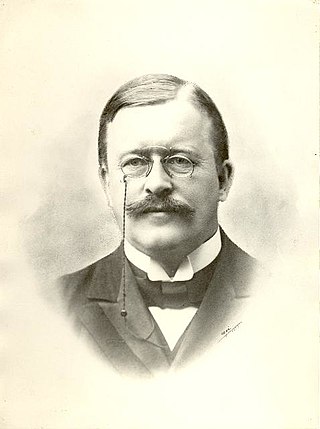Leaders
|
|
|
Centre Centrum | |
|---|---|
| Leader | Frits Hansen |
| Founded | 1893 |
| Dissolved | 1903 |
| Split from | Liberal Party |
| Merged into | Coalition Party |
| Newspaper | Framgang (from 1894) Eidsvold |
| Ideology | Social conservatism [1] Agrarian protectionism [1] Pietistic orthodoxy [2] Unionism [3] |
| Political position | Centre |
Centre (Norwegian : Centrum) was a political party in Norway founded in 1893 and led by Frits Hansen. [4] It positioned itself as a moderate middle party between the Conservative Party and the radical Liberal Party.
Centre was founded by eastern moderates who had been politically homeless since the 1888 Liberal split, and it was often characterised as the Eastern Norway parallel to the Moderate Liberal Party (based in the south-west). While informally known as the "Moderate Party of Eastern Norway", it remained an independent party-organisation despite talks of a possible merger. Their common goal was to work against the Liberals' policy of challenging the union with Sweden, expanding voting rights, and taxes. [3]
Presenting itself as a rural agrarian party with its base among farmers, Centre largely adopted the protectionist program of the Norwegian Agrarian Association from 1895/96. [5] The party was otherwise ideologically closely connected to the conservative Christian section of the folk high school movement. [4] Along with Frits Hansen, an educator himself, another co-founder was the priest and fellow educator Christopher Bruun. [1] In elections the party cooperated with the Conservative Party. [3] After declining support, some members joined the Conservative Party around 1900; [4] further, when the Coalition Party was formed in 1903, Centre was absorbed into the alliance. [6]
|
|
|
| Date | Votes | Seats | Size | Notes | |
|---|---|---|---|---|---|
| % | # | ± | |||
| 1894 | ???% | 4 / 114 | 4rd | ||

The Labour Party, formerly The Norwegian Labour Party, is a social democratic political party in Norway. It is positioned on the centre-left of the political spectrum, and is led by Jonas Gahr Støre. It is the senior party in a minority governing coalition with the Centre Party since 2021, with Støre serving as the current Prime Minister of Norway.

This article gives an overview of liberalism and radicalism in Denmark. It is limited to liberal and radical egalitarian parties with substantial support, mainly proved by having had a representation in the parliament. The sign ⇒ denotes another party in that scheme. For inclusion in this scheme it isn't necessary so that parties labeled themselves as a liberal party.
The Conservative Party or The Right is a liberal-conservative political party in Norway. It is the major party of the Norwegian centre-right, and was the leading party in government as part of the Solberg cabinet from 2013 to 2021. The current party leader is former Prime Minister Erna Solberg. The party is a member of the International Democracy Union and an associate member of the European People's Party.

A referendum on joining the European Community was held in Norway on 25 September 1972. After a long period of heated debate, the "no" side won with 53.5% of the vote. Prime Minister Trygve Bratteli, who had championed a "yes" vote, resigned as a result. This was Norway's second attempt at becoming a member, after having been vetoed by France in January 1963 and again temporarily in 1967, but the first attempt with a referendum on a set of fully negotiated accession terms.

Parliamentary elections were held in Norway on 12 and 13 September 1965. The Labour Party remained the largest party, winning 68 of the 150 seats. However, the four non-socialist parties succeeded in winning a majority between them and forming a government. Per Borten, the leader of the Centre Party, became prime minister.

Johan Castberg was a Norwegian jurist and politician best known for representing the Radical People's Party. He was a government minister from 1908 to 1910 and 1913 to 1914, and also served seven terms in the Norwegian Parliament. The brother-in-law of Katti Anker Møller, the two were responsible for implementing the highly progressive Castberg laws, granting rights to children born out of wedlock. Altogether, he was one of the most influential politicians in the early 20th century Norway.
The Moderate Liberal Party was a political party in Norway that emerged from the moderate and religious branches of the Liberal Party in 1888. The party's turn towards cooperation with the Conservative Party caused a party split in 1891, eventually sharpening its profile as a moderate-conservative party based among the low church of south-western Norway. The party was dissolved shortly after the dissolution of the union with Sweden in 1905.
The Free-minded Liberal Party was a political party in Norway founded in 1909 by the conservative-liberal faction of the Liberal Party. The party cooperated closely with the Conservative Party and participated in several short-lived governments, including two headed by Free-minded Prime Ministers. In the 1930s the party changed its name to the Free-minded People's Party and initiated cooperation with nationalist groups. The party contested its last election in 1936, and was not reorganised in 1945.

Søren Pedersen Jaabæk was a Norwegian politician and farmer. Jaabæk is the longest-serving member of the Norwegian Parliament in the history of Norway, and was one of the founders of the Liberal Party of Norway.

Jon Gundersen Hol was a Norwegian engineer and activist. He is known for his pamphlet Rifleringen, published in February 1884, that resulted in his arrest for lèse majesté. In the pamphlet, he called for soldiers and civilians to arm themselves and encircle the Parliament of Norway Building, creating a "Ring of Rifles", should the need arise. The political situation in Norway at the time was unstable, with an ongoing impeachment case against the conservative government started by political liberals. King Oscar II of Sweden and Norway supported the conservative politicians, and Hol believed that a political and military counter-offensive was planned, hence the need for guarding the Parliament. The tensions between liberals and conservatives drew Hol into politics in the first place in 1880. Before this, he was an engineer by occupation and a writer, albeit apolitical. He increased his writing after 1880, and also involved himself in non-socialist trade unions, including the unsuccessful attempt of establishing a national trade union center in Kristiania.
Gabriel Øidne was a Norwegian geographer and historian. Analyzing regional differences in party choice in Norway, he was the first to pinpoint factors relating to relations of production as well as counter-cultural cleavages when describing distinctions between Eastern and Western Norway. He also wrote several works on his native region, Agder, among others on the so-called child migration in older times.

Center Party is a registered political party in Norway. The party was established by several former county leaders from the Christian Democratic Party, defectors from the Socialist Left Party, the Labour Party, the Conservative Party and the Green Party, as well as former city councilor for the Labour Party in Oslo Geir Lippestad. The party's youth organization is Unge Sentrum.

Christopher Arndt Bruun was a Norwegian priest and educator.

Frits Hansen was a Norwegian educator, newspaper editor, biographer and politician.

Arvid Gilbert Hansen was a Norwegian newspaper editor and politician for the Labour and Communist parties.

Reinert Torgeirson was a Norwegian newspaper editor and politician for the Labour and Communist parties. He was also an active poet, playwright and novelist.
Framgang was a Norwegian newspaper, published in Lillehammer in Oppland county.
Tollef Hansen Kilde was a Norwegian forest owner, business founder and politician.

The Industry and Business Party is a Norwegian political party founded at Vemork in Rjukan on 29 February 2020. The party describes itself as a centre-oriented moderate party, with the slogans "Stability and predictability", "Development, not liquidation" and will, among other things, work to prevent a restriction of the oil and gas industry and better framework conditions for business in general. On 1 February 2023, the Health Party formally started the merging process with the Industry and Business Party.
I 1893 er Bruun også med å stifte et politisk parti: Centrum-Østlandet, en variant av Moderate Venstre. Profilen var kristelig-ortodoks, sosial konservativ og agrarproteksjonistiske på grensen til det nasjonalistiske påpeker Nerbøvik.
Profilen var pietistisk-ortodoks og agrar-nasjonalistisk.